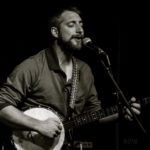Finger Lakes Sound: Music as language
by Ben Haravitch –
“A language works best when we have something interesting to say.” – Victor Wooten
In our world music is a commodity (something bought and sold), a distraction (something in the background), and a competition (on a gameshow, for example). It’s important to take notice when music is used as originally intended: as a means of communication. Music can be considered a language in every way. First, we learn to hear it, listen to it, understand it – things we can all do before we’re teenagers. If we’re given the opportunity to try at a young age, we learn to speak it. If we wait too long, our embarrassment hinders our development. And, if we’re forced to, we learn to read it.
Since we all learned how to listen to music at a young age (in the same way we learned to understand English), we all communicate with it. Participating in these exchanges is the best thing music has to offer. They happen every which-way: between musician and audience, between audience and musician, between musician and musician, and between audience and audience. What follows is an observational survey about these communication patterns.
• Between musician and audience: The most obvious form of musical expression comes from musicians. They seem to go out of their way to convey a message through powered speakers while the audience folk carry out conversation amongst themselves. A musician attempts to generate an energy feedback loop with the audience by broadcasting a mood, idea, or rhythmic persuasion in hopes of receiving a return transmission in the form of harmonic movement (i.e., dancing), or a smile.
• Between audience and musician: Audience folk uniquely possess the two most inherently clear forms of communication in music – the clap and the not-clap. Clapping says, “That was good, more please.” Not clapping says, “I know you just finished a song… it seems like one should clap… but no one is clapping… should I start the clap? … does anyone else notice the band? … at this point… clapping would be sad.” Sometimes, however, audience folk can’t help but subconsciously express their true feelings about music by tapping a toe or bobbing a head. Some have even been known to initiate a spontaneous dance. In turn, musicians notice these subtle messages and feed off of them.
• Between musician and musician: Similar to our English language, when inspected closely, some musicians speak more than others. Sometimes there isn’t that much to say. It’s especially interesting to watch musicians communicate while playing a song they’ve never played as a complete band before (which happens an awful lot more than one might guess). A bassist might play a run to signal a chord change, a drummer might switch beats thereby cueing the guitarist to go to the bridge, a fiddler might play a line so deliberately so as to summon the song’s end. With a little practice, one can find great joy in watching a band communicate.
• Between audience and audience: Specific audience folk prefer specific musical dialects. If ever traveling in unfamiliar territory and unsure who to befriend, a fruitful place to search is a music event where one’s specific musical dialect is spoken. If you like punk music, you’ll learn more about what to do in a new place at a punk concert than you could from a million pamphlets from the hotel lobby. Traveling aside, wherever you find yourself enjoying live music, remember this: the other audience folk in the room are your friends. You’re in the same place at the same time doing the same thing. And in the grand scheme, that’s pretty wild!
Summer is almost here, and with it come countless opportunities to engage in musical communication. Try to remember that live music and its shared experiences say so much more than TV or the internet want you to believe. A well-played note or an enthusiastic clap hold infinitely more meaning than a ‘like’ button.
 Ben currently lives in Warsaw, NY.
Ben currently lives in Warsaw, NY.
He teaches banjo, records music made by his friends, and performs with a variety of roots-based bands throughout the Finger Lakes region.
Click and go….